A Young Mom Was Arrested for Theft — and Died Mysteriously in Jail
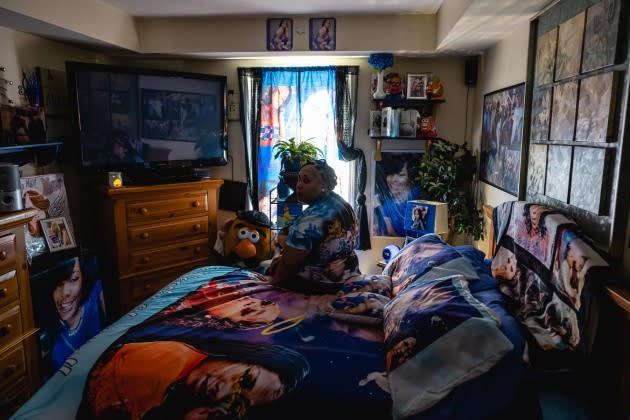
The first call for help came before sunset on the evening of July 15, 2021.
Related
Will an Oil Racket Destroy One of Africa's Most Sacred Places?
Tennessee Moves to Permanently Expel Police Officers Who Beat Tyre Nichols
Ed Sheeran Confesses: Tears, Trauma, and Those Bad Habits
“I’m throwing up blood,” Ta’Neasha Chappell, a 23-year-old mother in pretrial detention at the Jackson County Jail in Brownstown, a small town amid the hills and farms of southern Indiana, told the staff via intercom. “This is my second time. I overlooked it today the first time, but it’s happening again.”
More from Rolling Stone
Will an Oil Racket Destroy One of Africa's Most Sacred Places?
Tennessee Moves to Permanently Expel Police Officers Who Beat Tyre Nichols
A jail officer went to her cell to examine the vomit, did not believe it contained blood, and left. It was the beginning of a long, lonely night for Chappell. The only Black woman in her unit, she had spent more than seven troubled weeks at the jail, battling racist slurs from her fellow inmates. Chappell was an outsider, a lifelong resident of Louisville, Kentucky, about an hour’s drive south of Brownstown, facing charges including theft and fleeing the police.
Her calls for help continued throughout the night and into the next afternoon. During the nearly 19 hours that she begged for medical care — while vomiting blood, stumbling, falling, banging her head on a metal bed frame, wearing nothing but soiled underwear, becoming increasingly incoherent, and eventually writhing on the floor naked — jail workers failed to bring her to the hospital. Some accused her of faking her illness.
By the time the staff called an ambulance around 3:15 p.m. on July 16, it was too late. In two and a half hours, she would be dead.
The Indiana State Police investigated, and an autopsy ended in mystery, finding the cause of death to be probable toxicity from an unknown substance, with the manner of death undetermined. In other words, it was unclear how the toxic substance got into her system. In a nearly 900-page state-police investigation obtained by Rolling Stone, investigators said they found no evidence that Chappell had been poisoned by inmates or jail employees. The prosecuting attorney announced that no crimes were committed, and no charges were filed. Chappell’s mother, LaVita McClain, has launched a civil lawsuit against 13 jail workers, in addition to the sheriff, who is in charge of supervising the jail, alleging that a failure to provide adequate medical care led to her daughter’s death. The case is set to go to trial on June 26.
Who was Ta’Neasha Chappell, and how did this young mother from Louisville find herself in jail in this tiny, two-stoplight town? How did an arrest for theft lead to her lying on the floor in her own waste, pleading for help? Rolling Stone has collected the most comprehensive set of facts to date in order to piece together the final two months of Chappell’s life, including dashcam video of the arrest, jailhouse audio and video recordings, medical records, autopsy and crime-lab reports, witness depositions, and personal interviews with her family members and their attorney. They reveal a cascading series of criminal-justice failings that ultimately ended with her death.
The final hours of Chappell’s life offer a bleak reminder of the many ways that America’s justice system can fail Black Americans, through aggressive policing, unequal bail practices, jailhouse abuses, and more. According to dashcam video obtained exclusively by Rolling Stone, Chappell at first complied with police orders, but then fled after a cop approached her with his gun drawn. Why did she flee? Because, in her own words, “I just didn’t want to get shot. You gotta understand, it’s real scary out here, and I’m Black.”
“It’s an intersection of all sorts of awful things,” says Miriam Northcutt Bohmert, an associate professor of criminal justice at Indiana University in Bloomington. “Pretrial detention for people who can’t afford to get out on bail. Black people in southern Indiana being afraid of police officers. Lack of health care. Low education and pay for the correctional officers who are tasked with assessing people — many don’t have the training, the education, or the compassion.”
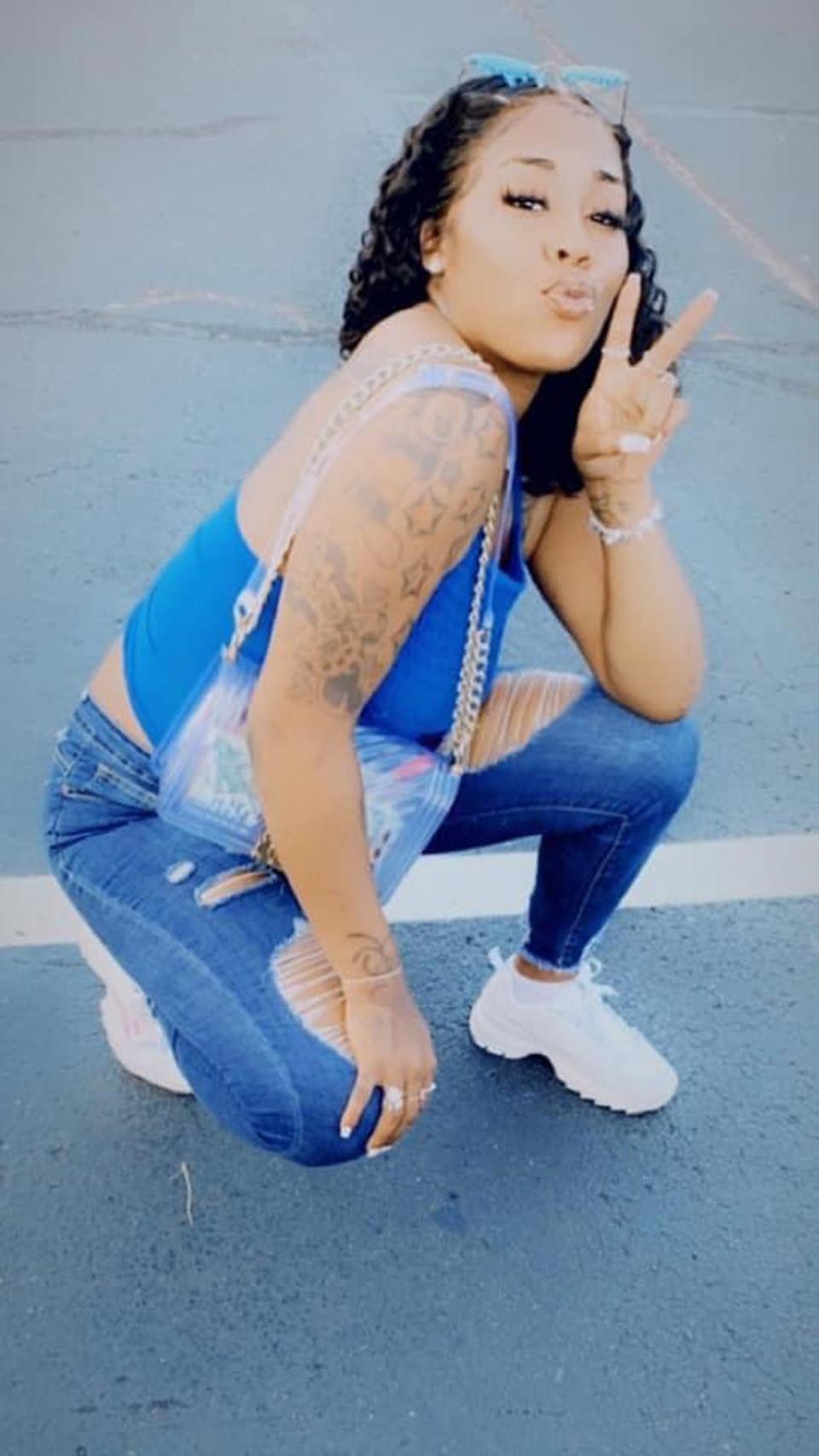
Indeed, the tragedy highlights widespread problems at America’s rural jails, which face many of the same issues as urban facilities — overcrowding, challenges in recruiting and training officers — but lack the economic resources to handle them. And rural counties incarcerate people at double the rate of urban areas, further straining resources, according to a 2021 study by the Vera Institute of Justice, a nonprofit that works to improve justice systems. “Fiscal pressures are an issue throughout corrections, but this can be especially true in smaller counties and jurisdictions where the tax base and public-funding infrastructure tend to be more limited,” says Jordan Hyatt, an associate professor of criminology and justice studies at Drexel University in Philadelphia. “This can translate to poorer conditions inside of jails and a failure to meet standards of correctional care.”
Add to this the fact that most people behind bars have not been found guilty of a crime, but rather, are serving pretrial detention, either because they were denied bail or were unable to pay it, says Hyatt. Such was the case with Chappell. She sat in her cell, unable to come up with the bail, awaiting a trial date six months away. This is her story.
IN A SCRAPBOOK she made in eighth grade, Ta’Neasha Chappell pasted photos of her family alongside swirling doodles of hearts, smiley faces, and peace signs. There’s a picture of her snuggling with her sister in an armchair at home in Louisville, a tribute to a brother she calls “my hero.” In a full-page love letter to her mom, she wrote, “You never let my hand go.”
Sitting around a table at the Louisville office of their attorney Sam Aguiar, Chappell’s family shares memories. A poster of Breonna Taylor — the Louisville woman who was fatally shot in her apartment by police in 2020 — hangs on the wall. Aguiar represented Taylor’s family.
Chappell’s sister, Ronesha Murrell, smiles as she recalls how she once persuaded her little sister, whom she called “Bugg,” to hide in the clothes dryer when they were kids. “It was easy to get her to do stuff. She used to be so naive.”
Her brother Joshua Shea remembers this: “I came home right after you let her out — she was pissed.”
“She never told on me,” Murrell says.
Their mother, LaVita McClain, who has an image of Chappell’s face tattooed on her neck, recalls how her daughter used to “crack up laughing” as a child when they shared a favorite joke: “Every time Ta’Neasha saw me, she would say, ‘What do I look like, Mama?’ I would say ‘Mr. Potato Head.’”
Chappell liked to make others laugh, too, McClain says, including strangers on the streets. “She could make the homeless people around her feel good — I remember us riding down the street; she’ll see them out there and say, ‘Come here, baby! Come here, honey!’ She’s joking with them and laughing with them. Sometimes she’d get out here and dance with them.”
She scrolls through her phone and finds pictures of her daughter’s old bedroom, which she has turned into a memorial, with a bedspread, carpet, and curtains emblazoned with images of Chappell. A trio of Mr. Potato Head toys sit on a shelf.
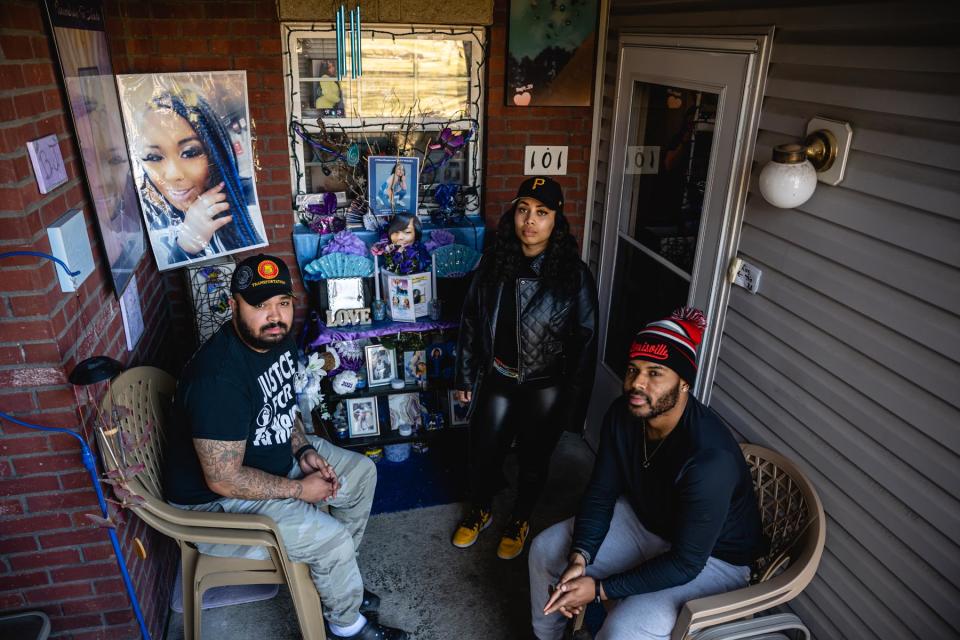
“Out of all of us, Ta’Neasha was the most vibrant, the most personable,” says Chappell’s brother Jeffontae McClain. “She just brought a lot of love and charisma with her wherever she went.”
“I remember her as my lightbulb, you could say,” says Shea. “I was always the quiet one when I was a kid. She was always more outspoken. When it came to me meeting new people or me talking to anybody, it normally came because she was like, ‘You need to get out of your shell.’ ”
Murrell recalls how her sister lifted her spirits when she felt down. “One thing about Ta’Neasha, she had her own insecurities, but she’s gonna make you feel good about yours. She used to just gas me up,” she says, beginning to cry at the memory.
Chappell’s life changed dramatically in the eighth grade, when she got pregnant by her boyfriend. After giving birth at age 13, she left school and began raising her daughter, Nevaeh, with the help of family. Chappell was “up and down” about her situation, her sister recalls: “She loved Vaeh, but she was trying to internalize that she was meant to be a mom so young.”
Over the years, Chappell fell in with friends who were a bad influence, her family says, and her childhood naiveté worked against her. “She ran around with some of the kids in the neighborhood; they were doing stuff like stealing, fighting, smoking,” Murrell says. “It really wasn’t her. She was a mama’s girl, the baby. She wanted people to like her and accept her.”
Shea remembers warning her about her friends: “I’d be like, ‘What are you doing? You need to change the people around you.’” But she “saw the good in everybody,” he says. “She would always say, ‘I understand, bro, but look, they’re doing this with themselves, they’re doing that with themselves, they just need a little bit more help.’ ” A number of arrests followed through the years, primarily for theft. Shea says her friends took advantage of her impressionability.
Chappell‘s mother, LaVita McClain, has saved this voicemail from Ta’Neasha.
Chappell’s siblings gradually moved away: Shea joined the military and got stationed in Georgia and Kansas; Murrell moved to Las Vegas and trained as a dental assistant; McClain went to Franklin College in Indiana. They all stayed in touch, but Chappell missed having them around. “She just wanted us close,” Murrell says, recalling how Chappell sent them a group text saying, “Y’all don’t love me!” Meanwhile, Chappell and her daughter “built an amazing bond,” she says.
Twice in her life, Chappell literally took a bullet for her loved ones, her mother says. The first time was when she was around 16 years old: “She was picking her daughter up from day care, and two dudes, they got into it. She was walking home and they start shooting, and she took her body and she wrapped it over her daughter. She got shot in the arm.” A few years later, when she was around 20, she got shot in a random drive-by shooting.
“She was in the car with her boyfriend,” her mom says. “She laid over top of him, and she took five bullets in her back.”
“Ta’Neasha would fight for you. She didn’t like bullies,” Murrell says. Shea notes that on the last day of her life, no one stood up for Chappell.
In recent years, to help support her daughter, Chappell had begun working as an exotic dancer. Murrell says her sister had a no-nonsense approach to the job: “I think it was just something where she felt like, ‘I need to survive, and I’m gonna do what I have to do.’ ” In the spring of 2021, just before her arrest in Indiana, Chappell got a new job at Taco Bell. She was happy about it, her sister says, because it was a day job with regular hours. Chappell posted on Facebook at the time: “I want a normal life & I’m coming for just that!!! For me & my lil one.”
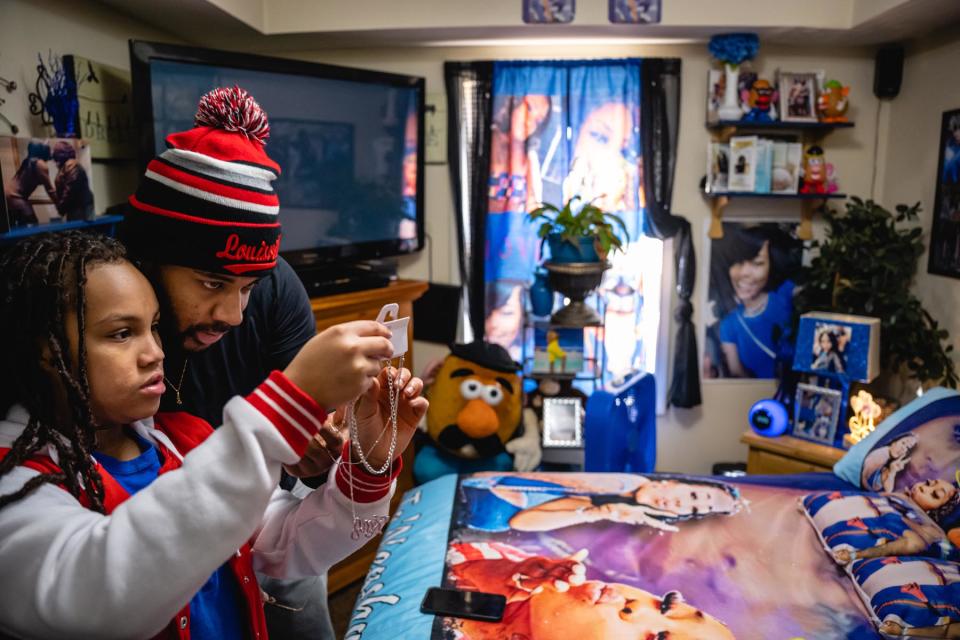
IN BROWNSTOWN, INDIANA, a rural town of just under 3,000, a handful of small businesses dot the main street: a florist, a pizzeria, a hardware store with pinwheels spinning out front. A Dollar General sits across the street from a Dollar Tree. In the town square, a historic brick-and-limestone courthouse with a clock tower takes center stage, with an olive-green Sherman tank on the front lawn. On the outskirts of town, the Jackson County Jail lies down the road from the fairgrounds and a speedway, where stock cars race on Saturday nights. Crops of corn and soybeans, cow pastures, and grain silos stretch for miles. This is John Mellencamp country — the musician shot scenes for his videos around Brownstown, having grown up in nearby Seymour.
When Chappell wound up in jail here, she was turning a corner, her sister says. “In her last days, she was getting it together,” Murrell recalls. “She wanted to change so much.”
But more trouble was to come. On the afternoon of May 26, 2021, Indiana state trooper Korry Clark heard a dispatch that a Black female driving a white Chevy Impala had stolen several thousand dollars’ worth of clothes from an outlet mall. Chappell’s car matched the description, and Clark initiated a stop. In dashcam video, Chappell pulls over as directed. Clark approaches with a gun in his right hand, holding it behind his hip.
“Put your hands out the window!” he yells, and she complies. He tells her to keep her hands in view until more officers come. She asks why she was stopped, and he says she is suspected of stealing. He later deemed this a misstep, stating, “I accidentally told her that we were investigating a theft,” according to police documents.
Initial Encounter Between Chappell and Police
A police representative clarified Clark’s comment to Rolling Stone, saying that in hindsight, Clark felt he shouldn’t have said Chappell was a suspect until he got more information and had assistance on the scene. An interview request with Clark was denied.
In the video, after telling Chappell she’s a suspect, Clark contradicts his original order, telling her to give him her keys. When she does not quickly do so, he holsters his gun and pulls open the door, saying, “Get out of the car!” She shuts the door. “I am!” she says. He reaches in through the window and opens it again, grabbing her arm to yank her out. She pulls her arm from his grip and speeds off.
A high-speed chase ensues. Chappell pulls over a second time, about 20 minutes after the first. This time, Clark approaches holding his gun out in front of his chest with both hands, pointing it at the car. She takes off again, eventually crashing into a ditch.
Chappell Flees Police a Second Time
Clark’s dashcam shows Chappell running up a hill before being forced to the ground by a group of officers. The camera is too far away to show what exactly happens when the officers surround her, but at some point, she is tased. (Indiana State Police did not start wearing body cams until later that year.) Officers found around $3,000 worth of stolen goods in her car, according to police documents.
Clark drives Chappell to a hospital in Seymour to get her checked out after the crash and to have her blood drawn, as a small amount of marijuana was found during the search. He explains that cameras have been running in the car ever since the initial stop. She says, “I just don’t want to get hurt by the police.”
“I’m not gonna hurt you,” he replies. “I wasn’t gonna hurt you up there. All you had to do was follow my orders, OK?”
“I was just scared,” she says.
The two talk to each other cordially throughout the drive. At one point, Clark says there were nearly 20 police cars involved in the pursuit. A very telling discourse ensues about why she fled the initial pullover.
“I just didn’t want to get shot,” she says, noting that she is Black.
“Well, if you wouldn’t have pulled away from me when I first stopped you,” he says.
“You scared me with the aggression,” she says. “As soon as I seen your gun, it scared me half to damn death. I was like, ‘Oh, my gosh, he pulled a gun. My hands was out. He sees my hands. Why’d he pull his gun out on me?’ ”
“My gun was not pointed at you. It was out of my holster because of the situation,” Clark says. “We knew that you had stolen stuff because of the description of your vehicle. I don’t know if you have a gun or not; I have to be ready. I never pointed it at you. When I was trying to get you out of the vehicle, I put it back in my holster.”
Chappell Talks With Officer After Her Arrest
At another point, Chappell asks Clark, “Are you the one who tased me?” He says no. She says she was tased while on the ground, surrounded by officers, and asks why she was tased after having been subdued. Clark says she was still standing when she was tased. “They tased you because it keeps you from fighting, and it keeps people from getting hurt,” he says. She replies, “I wasn’t gonna fight, I promise you. That’s one thing I’m not gonna do is raise my hand to no officer.”
AT THE HOSPITAL, Chappell shared her medical history, including ulcers and sickle cell disease. Then Clark drove her to the jail, where a series of missteps regarding her medical background followed, according to police documents. First, Clark neglected to include her medical history on the book-in form because he inadvertently skipped a page. Then, the jail staff failed to do a medical screening, as required by state regulations.
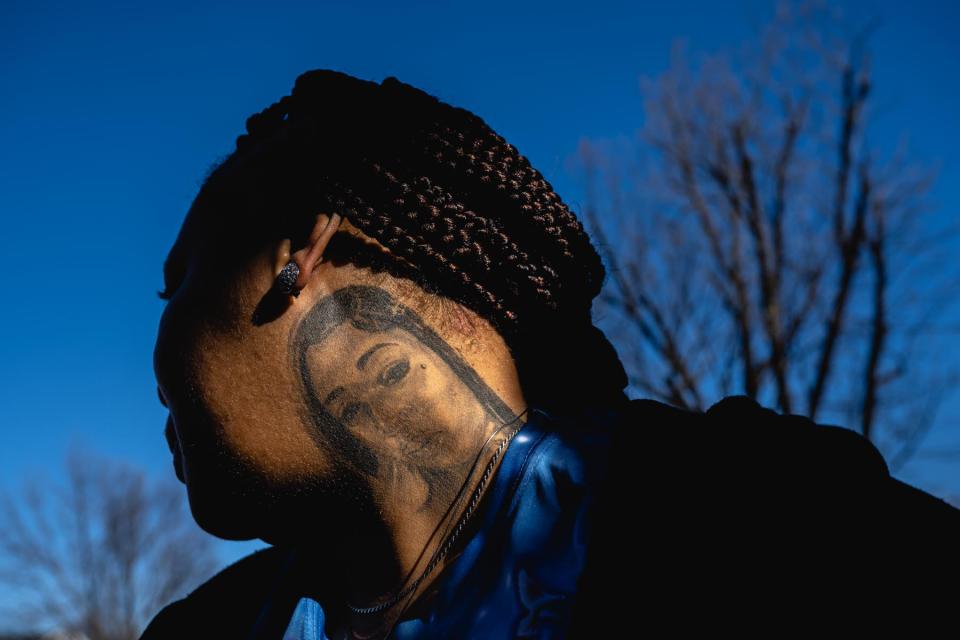
On June 3, 2021, eight days after her arrest, Chappell was charged with escape, three counts of resisting law enforcement, theft, leaving the scene of an accident, reckless driving, and possession of marijuana. At the hearing, the judge entered a preliminary plea of not guilty and set bail at $4,000 and a trial date for Nov. 23. Chappell had no public defender yet, which is not unusual in Indiana but is problematic for defendants, as they have no one advising them, according to the Indiana Public Defender Council, a state agency tasked with improving representation for indigent people.
Chappell got a public defender eight days after the hearing. She requested a bond reduction at a July 8 hearing, testifying about her medical issues, while a prosecutor pointed to her criminal record. The judge did not reduce the bond. Her family tried to get the bail money together, to no avail.
She began writing little notes to herself and her loved ones in jail, to help her cope. In one, she wrote about her plans to go to Seven Counties, a community mental-health center, when she got out. “Ima go!” she wrote.
Chappell was assigned to “J-pod,” the unit for maximum-security prisoners. As the only Black woman in her unit, she was an outcast from the start, Aguiar says, describing watching jailhouse video for hours on end: “You see all these women talking, and she’s sitting on a bench by herself.”
In police documents, her former inmates described heated interactions, admitting to hurling racist slurs. One inmate said she called Chappell a “n—-r bitch” after a dispute over a breakfast tray, and that she called Chappell the n-word some 50 times in all.
Makayla Smith witnessed Chappell’s struggles, as the two spent time together in quarantine when they arrived at the jail amid the pandemic. Smith tells Rolling Stone that when she first met Chappell, “she seemed like the life of the party.” They talked into the night about relationships, family, faith. “She was a girl with heart. She was so funny,” Smith says, recalling how Chappell told her about a cousin who would run over people’s feet in her wheelchair. The pair planned to go to the Kentucky Kingdom theme park together one day.
Everything changed when they got moved into different pods, Smith says, and Chappell was ostracized. She recalls seeing her through a window, sitting alone while wrapped in a blanket. “The bright aura around her had turned to darkness,” she says. When Chappell got into the dispute over the breakfast tray, in which she was accused of taking someone’s food, Smith heard women angrily calling her the n-word. “Everyone in my pod was talking down on her and making racial slurs,” she says. “I knew she was provoked. She would never take someone’s food without someone provoking her or taking her food first.”
Chappell scrawled in a handwritten note to herself, “This place is hell.”
Smith left the jail on July 14, 2021. The next day, a dispute erupted: It was Chappell’s day to be in charge of the remote, and she muted the TV and took a nap, angering other inmates. More racist slurs flew her way.
That evening, Chappell began vomiting.
Chappell’s final 19 hours at the jail were indeed a descent into hell.
Her ordeal started in earnest when she made the first intercom call around 8:30 p.m. on July 15, saying she was vomiting blood. In audio recordings obtained by Rolling Stone, calls from Chappell and other inmates continued regularly throughout the night. Here are just a few:
1:33 a.m.: “I need help,” Chappell says. “I need a nurse.… I need to go to the hospital.”
2:25 a.m.: “I need to go to the hospital,” she says three times. “I’m throwing up blood.”
3:10 a.m.: “I’m dehydrated. My whole bucket is full with vomit,” she says. “I’m throwing up blood.”
9:55 a.m.: “I need help,” she says, then repeats it eight times.
10:48 a.m.: An inmate calls: “Uh, do you not see that we got a naked lady on the floor in here?”
Chappell, after vomiting all night and becoming increasingly incoherent, had left her cell and entered a common area wearing nothing but underwear soiled with feces. Then she collapsed.
Throughout the night and morning, jail staff visited Chappell’s cell, but no one called the hospital. The sergeant on duty, Scott Ferguson, called the jail nurse, Ed Rutan, late in the night, advising him of two inmates with medical issues: Chappell and a female inmate with chest pain. The inmate with chest pain, who is white, according to the civil suit, got sent to the hospital.
Around 12:30 p.m. on July 16, jail officers moved Chappell to a holding cell, where they could see her on camera stumbling, falling, and hitting her head on a metal bunk with a bang.
Around 2:31 p.m., jailhouse video shows the nurse, Rutan, telling Chappell, who is naked, to get dressed. A couple of minutes later he says, “Last chance, either you get up and get dressed and come on out and talk to me, or I’m just gonna go back to doing my thing.” Then he leaves. She appears to be delusional, attempting to put on invisible shoes.
Around 3:12 p.m., jailhouse video shows Sgt. Tami Baxter telling Chappell, who is lying naked on the floor and moaning, to dress herself. “This just makes us think you’re faking it,” Baxter says. “If you’re not gonna get up and get dressed, we’re just gonna leave you alone. And you can just sit there and suffer.” Chappell says she feels like she’s “on fire.” She attempts to stand and falls against the wall.
Around 3:15, the staff finally called for an ambulance, but didn’t say it was an emergency, according to police documents. An ambulance arrived at the jail at 3:29. At the hospital, Chappell was intubated, but it was all too late. At 5:45 p.m., she was pronounced dead. The doctor said he was shocked because he had not been told to expect a critical patient, the police documents reveal.
Why did no one call the hospital for nearly 19 hours? A lawyer for the sheriff and jail workers named in the civil suit declined to comment, citing ongoing litigation, but their depositions provide some answers — and reveal a tangle of problems, including miscommunications among the staff and an apparent lack of knowledge about how to recognize and handle medical emergencies at the jail.
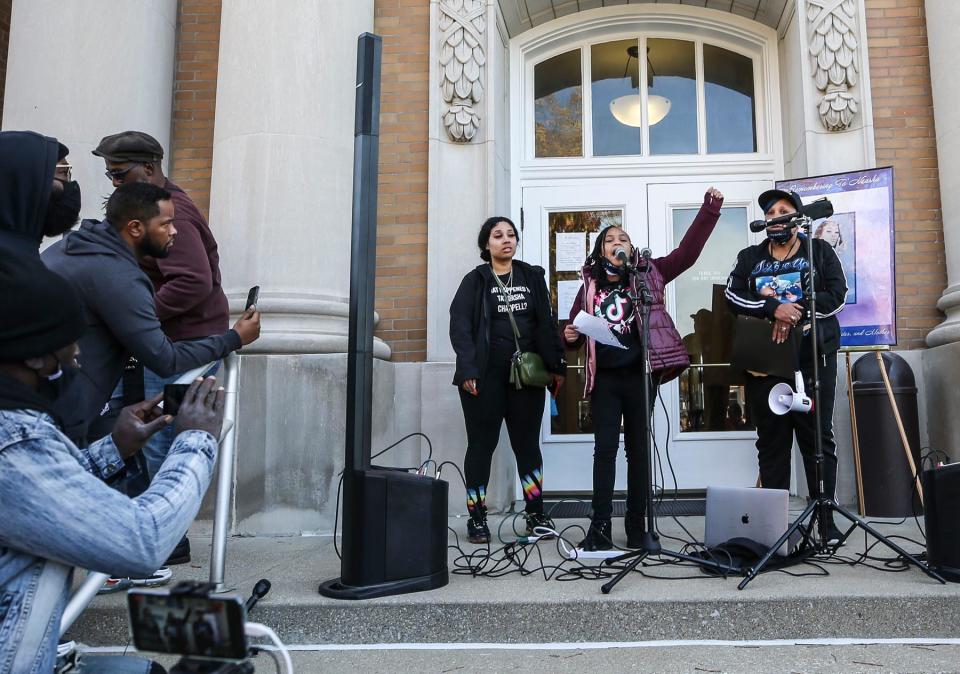
For example, the night sergeant, Ferguson, said he knew only that Chappell was vomiting, not that anyone had seen blood in her vomit. But jail officer Seth Boyd, who had seen the blood, said he had told the sergeant. Boyd also said that if it had been up to him, he would have called the hospital. The sheriff, Rick Meyer, said Boyd should have called the hospital, since blood in vomit constitutes an emergency, and that he would not have needed approval. Meanwhile, the nurse, Rutan, admitted he had failed to do a medical screening on Chappell at any time during her incarceration, saying that as the sole nurse of the jail, he was several months behind on screenings. He said he had informed Meyer of the backlog. Meyer said he was unaware of the problem. Baxter, the officer who said Chappell could just “suffer,” said the comment was “a tactic to try to help motivate her to get up” because she knew nothing except that Chappell needed to get dressed.
They all said that an inmate who is vomiting blood, as Chappell was, should be taken to the hospital immediately.
Chappell’s death remains a mystery. In the autopsy, the forensic pathologist listed the cause of death as probable toxicity from an unknown substance due to several factors, including a green liquid in Chappell’s abdomen and her altered mental state, among others. A crime lab tested Chappell’s bodily fluids for illegal narcotics as well as several chemicals, including components of antifreeze — the doctor at the hospital had said her lab results suggested possible poisoning by antifreeze. The tests came back negative for the narcotics and chemicals, ruling out antifreeze as the toxin.
Some inmates said Chappell had been poisoned by prisoners who had allegedly been slipping a cleaning product, which they called “the green cleaner,” into her food and drink, according to police documents. The jail provides inmates with a solid emulsion degreaser to clean their cells. State police investigated and said they could not substantiate the claims. One inmate pointed investigators to a bottle of Mountain Dew that had allegedly been spiked with the cleaning product. An investigator observed that the bottle contained a darker liquid with particles. He attempted to find a lab that would test Chappell’s bodily fluids for the cleaning product but could not find one that could do so, according to police documents.
Within a month after Chappell’s death, another person died after being in custody at the Jackson County Jail. Joshua McLemore, who had a history of mental illness and narcotics abuse, spent 20 days at the jail while his case was pending; he remained in a dissociative mental state, naked and mostly not eating, drinking, or sleeping. When he was finally taken to the hospital, on Aug. 8, 2021, he died within two days of multiple organ failure. The state police determined that no individual had committed a crime but that McLemore likely died due to “a prolonged lack of attention” from the staff, according to the county prosecutor. No charges were filed.
DURING THE NEARLY 19 hours that Chappell was begging for help, her family had no idea.
Her sister remembers going about her business that day, bringing her son to a water park. “They had a duty to protect her,” she says of the jail officers. “She was not attended to because she was a Black woman and they didn’t feel like she was worth getting any attention.”
“It’s a heavy, a dark, a painful situation,” Jeffontae McClain says. “I would just ask, as people read over this, don’t read this and think, ‘This doesn’t apply to me, this is a sad story.’ Read this and think, ‘If this was to happen to me or to somebody I care about, what could I do to help?’ Because that’s what’s gonna contribute to change.”
McClain asks his family members what they tell people who want to help. Shea says he sends people to JusticeForTaneasha.com. Murrell says she asks people to share Chappell’s story. Sara Collins, an attorney working with Aguiar, suggests telling people to contact the FBI and call for a federal investigation. The family has also held rallies, desperately seeking accountability.
McClain suggests that the family think more broadly about ways to make a difference. He proposes asking people to perform an act of kindness in honor of Chappell. “We tell people all the time that Ta’Neasha was a very infectious, contagious, loving, bubbly person who cared about everybody,” he says. “How can we make that something that’s universal, something that impacts everybody, whether they know it or not?”
They all like this idea: an act of kindness.
In one of her notes to herself in jail, Chappell wrote about her future, about how she planned to turn her life around. “I’m missing my baby girl like crazy. Whew I gotta change this BS for this girl. She don’t deserve none of this shit I’m doing man. None of it! When I go home, my main focus is Seven Counties, my daughter and my job. All the other shit is for the birds. I will make it right. I promise myself and my little one.”
Two weeks after Chappell died, Makayla Smith, the one friend she made in jail, went to Kentucky Kingdom, where the two had planned to go together one day when they were free. Sliding down the towering waterslide at the park, she says, “we were holding hands the whole way down.”
Best of Rolling Stone

 Yahoo Finance
Yahoo Finance 